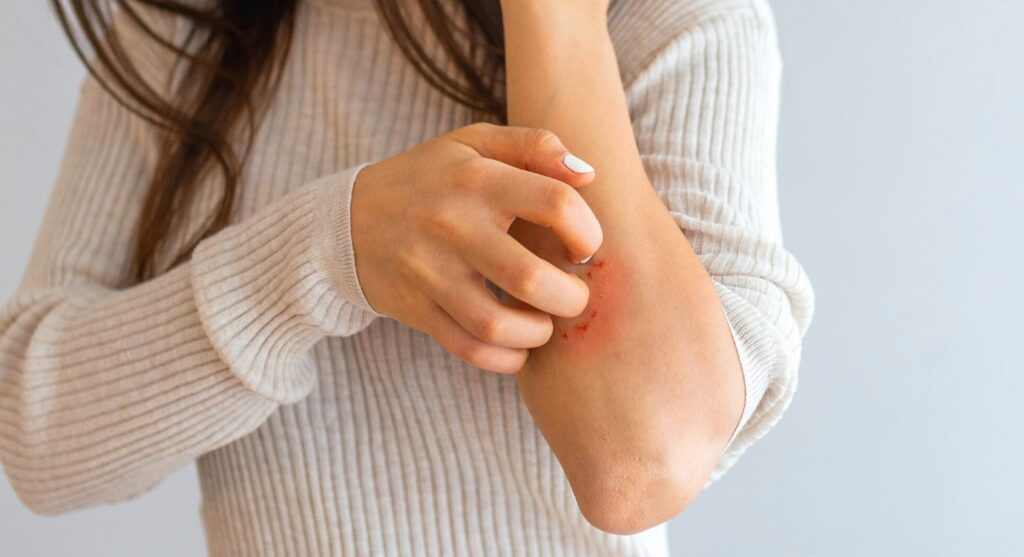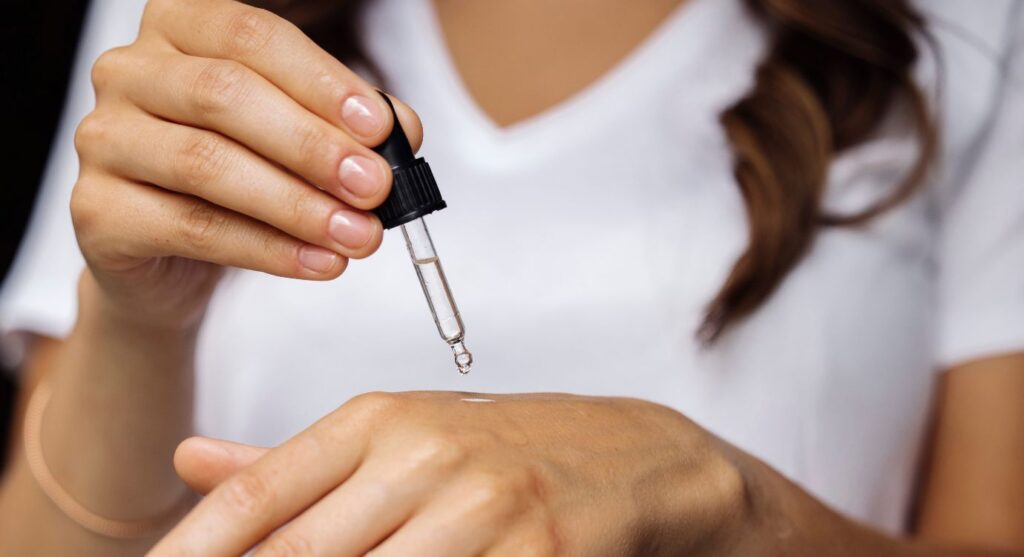Free delivery on all orders over £45
Free delivery on all orders over £45

Medically reviewed by
Eczema is one of the most common inflammatory skin conditions in the UK.
Around one in five children and one in ten adults suffer from atopic eczema.
The scratch-itch cycle of eczema flare-ups can significantly impact a person’s life, but there is some hope that CBD oil could one day become a viable treatment option.
CBD oil for eczema is not a recognised treatment, but the ingredient is growing in popularity with skincare companies. Even high street shops carry lotions, creams and balms enriched with this increasingly popular botanical ingredient.
So, if you’re considering using CBD oil for eczema, we’ve put together this short guide to help you to understand:
Let’s get stuck in.
Eczema is sometimes referred to as atopic dermatitis. It is a non-contagious inflammatory skin condition most common in children, although it can also affect adults.
The exact cause of eczema is unknown. For some people, it may be triggered by irritants such as soap or washing powder. For others, it may be linked to stress and poor sleep.
Eczema can occur anywhere on the body, but it is most common on the hands, backs of the knees and the inner elbow. Children are more likely to have eczema on their face or scalp.
Eczema often starts with dry and itchy skin. Then, scratching may lead to redness and inflammation, which triggers a cycle of more itching and scratching.
“How do I know if I have eczema?”
Eczema may appear red on lighter skin and deep brown, purple or grey on darker skin. It is often harder to diagnose on darker skin as it is more difficult to see.
Your doctor or pharmacist can diagnose eczema just by examining your skin – you may then be referred for specific allergy testing to confirm what triggers your flare-ups.
Treatment may include identifying and eliminating your triggers. This can include changing your products, including your shampoo and shower gel.
Some people suffering from eczema need to apply thick and oily skin creams multiple times a day to help prevent dryness and repair the skin moisture barrier.
Your doctor or dermatologist may also prescribe a steroid cream to help tackle flare-ups.
10% off on your first order
Complete this one-minute quiz and find the right products for you.
CBD products are thought to support the endocannabinoid system to enhance your sense of well-being and overall health.
Our skin also contains endocannabinoid receptors – the skin has long been accepted as a passive barrier to infection, but newer research suggests that it has a much more active role than previously thought.
In addition, CBD is believed to help reduce inflammation and offer antimicrobial protection. As eczema is an inflammatory condition, it makes sense that CBD might provide relief for those suffering from eczema.
Read more: CBD oil for skin
There is some(very limited) evidence to support the use of CBD for eczema. Unfortunately, just not that much research has been carried out yet.
However, one study did investigate the anti-inflammatory properties of CBD directly related to skin cells – finding that CBD blocked the release of various inflammatory factors.
As such, researchers concluded that CBD might be useful for reducing inflammation in skin disorders, including eczema.
Patients with atopic eczema were also part of another very small study (which also included people with psoriasis) that tested the effects of CBD topical creams on people with severe skin conditions. The study found that CBD did improve the symptoms, with no irritants or reactions reported.
Read more: CBD oil for psoriasis
The problem with this research is that it’s incredibly limited and deals with tiny samples.
The study discussed above only had 20 participants, and not all of them had eczema. So it’s very difficult to draw empirical conclusions or apply findings to a broader population.
If you’re looking to try CBD for eczema, choosing a CBD oil or topical CBD cream will likely be your best bet.
A high-quality CBD oil can be applied directly to your skin or added to your favourite skin cream. Adding CBD oil to a rich and creamy emollient is an excellent way to give your skin a nourishing treat.
Emollient cream helps repair the skin moisture barrier, so it’s ideal for those living with eczema.
Since CBD is oil-based, combining it with oil-based skincare makes sense.
Before applying CBD oil directly to your skin, check the ingredients for potential allergens – CBD oil typically contains carrier oil (MCT oil and hemp seed oil are the most common) and may also include flavourings.
Terpenes in CBD oil are also more likely to cause a reaction. To avoid this, choose CBD skin creams made with CBD isolate instead of applying CBD oil directly to your skin.
CBD brands could add other ingredients, such as turmeric and valerian root, to their products to offer additional benefits. These ingredients might not be suitable for eczema treatment, so always check product labels.
Read more: CBD oil with turmeric
Topical CBD cream is also an excellent choice for people with eczema to try.
You should apply the cream as you would any other topical; massage a small amount onto the area you’re looking to soothe until it is fully absorbed, and reapply when needed.
Make sure you don’t apply the product to broken skin – this goes for CBD oil, too. As with oils, always check the ingredients and ensure there is nothing in your CBD topical which may cause an allergic reaction.
If you suffer from inflamed skin, a CBD balm with cooling ingredients such as camphor or peppermint may help soothe the itch.
Balms are thicker and will need to be applied less often. Although a balm will be more greasy than a cream or a lotion, this intense moisturising effect is required to help restore the moisture barrier.

If you’re considering using CBD for eczema, we’d always say start low and slow. Begin with a low dosage product, and work your way up, increasing the dosage gradually until it feels right for you.
There are no guidelines on specific CBD dosage for eczema but always stay within FSA guidelines, which recommend consuming a maximum of 70mg of CBD per day.
There are no rules for when to apply CBD for eczema. Reapply as you feel necessary – as long as you aren’t exceeding stated dosages.
Our top tip if you are using a balm or cream is to apply your CBD for eczema at night and then cover with a thin cotton layer such as socks, nightwear or gloves. This may help repair and soften your skin while you sleep.
With a plethora of products out there, it can be hard to know where to start when selecting a CBD product, especially when you plan to use the product to soothe a condition like eczema.
Here are some tips to help you make an informed choice:
CBD is generally well tolerated and has a good safety profile.
In the small studies conducted on CBD and eczema, no adverse reactions were recorded – but much more research needs to be done to establish an empirical consensus around the safety of using CBD for eczema.
Our advice is always to buy CBD from reputable sellers and check the other ingredients – such as carrier oil in CBD oil and added substances in topicals and creams intended for skin.
While CBD may not provoke adverse reactions in an eczema sufferer, other ingredients in CBD products could. If using CBD for eczema, it’s a good idea to patch test a small amount to help determine whether you might experience an adverse reaction.
Yes, CBD may be useful for relieving itchy skin and dryness. But make sure never to apply CBD to broken skin.
While CBD gummies could help eczema, there’s no research to support this. It’s much more effective to apply topical CBD for eczema (in a cream, balm, or oil) directly onto the skin.
While a whole lot more research needs to be done on the potential of CBD to relieve the symptoms of eczema; initial research does look promising.
It makes sense that CBD’s anti-inflammatory properties could be a potent weapon against this inflammatory and painful skin condition.
However, until more clinical conclusions are drawn, note that CBD isn’t a cure for eczema.
If you take other medications, these may not react well with CBD. So always consult a medical professional if you are thinking of using CBD to help soothe your condition.
Sign up for the Evopure newsletter:
This product is not for use by or sale to persons under the age of 18. It should not be used if you are pregnant or nursing. Consult with a physician before use if you have a serious medical condition or use prescription medications. A Doctor’s advice should be sought before using this and any supplemental dietary product. This product is not intended to diagnose, treat, cure or prevent any disease.
© Evopure Ltd. All rights reserved Terms & Conditions Cookie Policy Sitemap